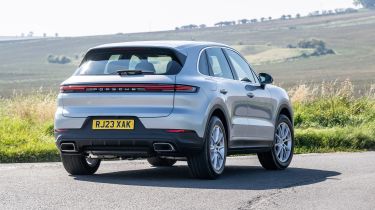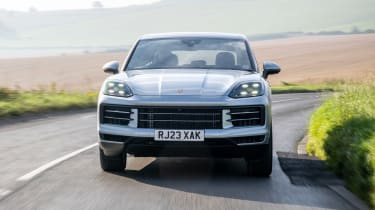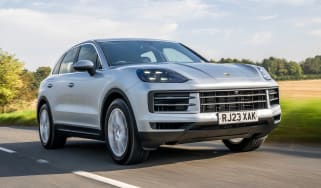Porsche Cayenne SUV - Engines, drive & performance
The Porsche Cayenne raises the bar for sports SUV handling and performance
The previous generation of Cayenne was typically assessed as having excellent handling and performance characteristics, although the caveat 'for an SUV' always applied. This time, though, the gap between the Cayenne and a sports saloon has narrowed markedly.
Porsche's engineers spent countless hours honing the chassis shared with the Audi Q8 and Bentley Bentayga to feel at home under a Porsche – and their efforts have paid off. As well as setup changes, a lot of sophisticated technology has been employed to optimise its behaviour on and off the road.
Key to this is a '4D chassis control' system that constantly monitors dozens of parameters, controlling an air-suspension system to ensure the car is best set up to tackle the prevailing road or terrain conditions. Off-road forays are taken care of by gravel, mud, sand and rock driving modes, with different ride-height options for each.
The four on-road driving modes are more likely to be exploited frequently, and optional electrically operated anti-roll bars and rear-wheel steering allow for an even more impressive repertoire of talents. Even without these, the Cayenne far surpasses the handling and roadholding standards of virtually all its rivals. Body lean is virtually non-existent and grip is formidable, although it can be coaxed into a controlled slide in the hands of an experienced driver.
More reviews
An update to the Porsche Cayenne range in 2023 has made it even better to drive, adding an improved suspension system with a new dual-valve PASM adaptive damping unit, allowing the driver to tweak settings more extensively. When driven in Comfort mode, the Cayenne rides with much more composure and less of a jiggling sensation for passengers, though we’ve found the base model on steel springs transmits a little more patter and noise into the cabin than we’d expected. The update also makes the Cayenne much sportier when you want it to be – both the base 3.0-litre Cayenne and the E-Hybrid we’ve tried since the facelift have felt surprisingly agile for something so tall and heavy. There is plenty of grip and some welcome feedback through the steering, which can’t be said of many other luxury SUVs.
The E-Hybrid is particularly versatile, and impressed us on a variety of British roads. It felt refined and while it’s very quick, it’s also smooth. This can sometimes be an area where plug-in hybrids falter, due to frequent switching between their combustion engine and electric power. The eight-speed gearbox fitted to our test model was faultless and worked well in any driving mode. Our only real gripe was that the V6 engine doesn’t sound the best, but it’s much less intrusive in the hybrid model anyway, given its ability to drive around on electric power on shorter stop-start journeys around town.
Options include active anti-roll stabilisation tech, torque vectoring and rear-wheel steering – the latter of which featured on our test car. It contributed to helping the Cayenne feel agile and keen in the corners and yet felt natural. We recommend specifying this on the E-Hybrid as it goes some way to offsetting the extra weight of its heavy battery.
We’ve now since driven the Porsche Cayenne GTS which gets 10mm-lower suspension compared to the other models in the lineup, as well as the adaptive air suspension, dual-valve dampers and aforementioned torque vectoring system. These all combine to make for a sportier drive, but it’s not quite to the extent that we’d say it’s worth the extra outlay. Even lesser versions of the Cayenne feel more agile and capable than a car of its type should.
Put the Cayenne GTS into ‘Normal’ mode and it’s surprising how easy it is to drive. Around town it feels nimble thanks to the four-wheel steering, and on the motorway the engine is quiet when you want it to be, letting out the slightest background burble with wind noise the only slight disturbance.
Air suspension is also an option which we recommend opting for – it improves the Cayenne’s ride and handling significantly, further helping to perfect the balance between driving dynamics and comfort. It even allows for greater off-road capability, because the ride height can be raised and lowered at the touch of a button.
The brakes are also very positive, which is essential as the Cayenne gathers momentum very rapidly and weighs over two tonnes. A carbon-ceramic brake setup can be chosen – it's even more effective but extremely expensive to buy and maintain.
Porsche Cayenne petrol engines
The Porsche Cayenne engine line-up was quite broad, but was simplified in 2023 as part of its facelift. The entry-level Cayenne’s 3.0-litre turbocharged V6 engine was updated to produce 353bhp up from the pre-facelift figure of 335bhp. The Cayenne S’s previous 2.9-litre twin-turbocharged V6 that produced 434bhp was swapped out for a 4.0-litre twin-turbocharged V8 engine with 474bhp.
A GTS model was reintroduced in 2024 which also uses the same twin-turbocharged V8 engine, albeit tuned up to 493bhp. The soundtrack this engine gives out is incredibly addictive, and a little obnoxious while it propels the Cayenne from 0-62mph in just 4.4 seconds. All models send power to an eight-speed automatic transmission with drive going to all four wheels.
Porsche Cayenne hybrid powertrains
Buyers can specify the Porsche Cayenne in E-Hybrid guise, which pairs the 3.0-litre V6 engine with an electric motor for a total output of 463bhp, so it’s no slouch – that’s also more than the pre-facelift E-Hybrid – with the benefit of a 46-mile electric range for shorter trips around town. The burst of instant torque from our E-Hybrid test car meant that despite its weight, the plug-in hybrid SUV offered a solid response.
Overall the E-Hybrid never feels all that fast, despite its high power figure – that said, it still feels punchy enough for most drivers. The Cayenne E-Hybrid still felt agile thanks to our test car’s four-wheel steering, and it’s a feature we’d recommend if you go for the plug-in hybrid.
Two more plug-in hybrids have been introduced to the range: the Cayenne S E-Hybrid and the Cayenne Turbo E-Hybrid. The Cayenne S E-Hybrid ups power from the V6 and electric motor combo to 512bhp – we’re yet to drive it, but a slightly quicker 4.7-second 0-62mph sprint time means it should feel a little quicker than the Cayenne E-Hybrid if you need to scratch that itch.
The most powerful of the entire range is now the Cayenne Turbo E-Hybrid, which boasts a whopping 729bhp, and does the 0-62mph sprint in just 3.7 seconds thanks to a larger 4.0-litre V8 engine combined with the hybrid electric motor. It’s expensive, though, coming in at just over £130,000.














